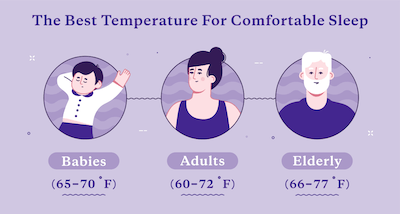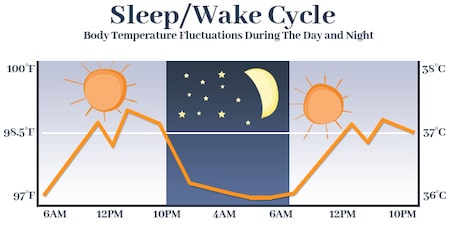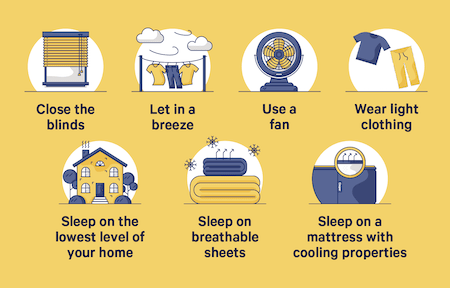If you’re having trouble sleeping, it might be because of the temperature in your bedroom. According to experts, the best bedroom temperature for sleep is around 65 degrees Fahrenheit (18.3 degrees Celsius). That said, this varies slightly from person to person; however, doctors typically recommend keeping the thermostat between 60-67 degrees Fahrenheit (15.6 – 19.4 degrees Celsius) for optimal slumbering comfort.
So if you find yourself tossing and turning at night, try adjusting your thermostat and creating a cooler environment — it just might be what you need for better sleep!

Temperature for Infants
Table of Contents
When it comes to babies and young children, the best bedroom temperature for sleep is also important. Parents should keep their child’s room between 60-70 degrees Fahrenheit (15.6 – 21.1 degrees Celsius). As always, if your baby seems too hot or cold, you may need to adjust the thermostat slightly in order to ensure they’re comfortable when sleeping. So instead of leaving it to chance, take the time to make sure your little one has a comfortable sleep environment!
How Does Temperature Affect Sleep
Temperature plays an important role in how well you sleep. For example, when your room is too hot, it can cause you to sweat and become restless throughout the night. On the other hand, if it’s too cold, it can make you shiver and keep you from falling into a deep sleep. Additionally, studies have also shown that maintaining an optimal bedroom temperature — between 60-67 degrees Fahrenheit (15.6 – 19.4 Celsius) — may help your body produce more melatonin and serotonin, which are essential hormones for getting a good night’s rest. So be sure to keep the thermostat set just right for maximum comfort!
Circadian Rhythm
Our circadian rhythm is an internal clock that tells us when to go to sleep and when to wake up. This 24-hour cycle is influenced by external cues like temperature, light, noise, and our daily habits. Keeping your bedroom at the optimal temperature for sleep can help regulate this rhythm and improve your overall quality of rest.
Vasodilation
Vasodilation is a process in which the blood vessels in your body dilate or expand. This can occur when you are too hot and can prevent you from getting enough oxygen to your brain, leading to sleep disturbances. Keeping your room cooler will help reduce vasodilation and improve your overall sleep quality.
Onset Insomnia
Onset insomnia is a type of sleep disorder in which it takes a long time for you to fall asleep. It can be caused by a variety of factors, including stress, anxiety, depression, and the environment. Maintaining an ideal bedroom temperature — between 60-67 degrees Fahrenheit (15.6 – 19.4 Celsius) — may help reduce the onset of insomnia and make it easier to drift off into a peaceful slumber.
Decrease in REM and Slow-Wave Sleep

REM and slow-wave sleep are two of the most important stages of sleep for our bodies. Unfortunately, studies have shown that when your bedroom is too hot or too cold, you may experience less REM and slow-wave sleep than necessary. Keeping the temperature at a comfortable level can help promote these stages of restful sleep.
What Happens When Your Bedroom Is Too Hot
When your bedroom is too hot, it can cause a number of sleep disturbances. Your body temperature needs to drop in order for you to fall asleep and stay asleep. When the room temperature is too high, vasodilation can occur — meaning that your blood vessels expand — which can lead to shallow breathing and reduced oxygen levels in your brain. This can prevent you from entering into a deep sleep and make it difficult to stay asleep all night long. So if you’re having trouble sleeping due to an overly warm environment, try turning down the thermostat or using extra cooling methods such as fans or air conditioning units.
What Happens When Your Bedroom Is Too Cold
Just like being too hot, being too cold can also prevent you from getting a good night’s rest. When the room is too cold, your body may start to shiver in order to generate heat, which can make it hard to fall asleep and stay asleep all night long. Additionally, studies have shown that overly chilly temperatures can reduce the production of melatonin and serotonin, two hormones essential for healthy sleep patterns.
Sleep Hygiene Habits
In addition to keeping your bedroom at the right temperature, there are also several other sleep habits that you should practice on a daily basis in order to get the best rest. These include avoiding stimulants such as caffeine and nicotine, regular sleep and wake times, and maintaining a dark, quiet during the night.
So remember – when it comes to achieving a good night’s sleep, temperature is key! Make sure your room is just the right balance between warm and cool for maximum comfort and restorative benefits so you can always wake up feeling refreshed.
Tips for Keeping Your Bedroom Cool

1. Invest in a good mattress: A breathable, supportive mattress can help reduce body heat and keep you cooler throughout the night.
2. Use light, natural miracle sheets: Opt for lightweight materials such as cotton or linen, as they are more breathable than heavier fabrics like flannel or fleece.
3. Turn on your fan: Fans create air circulation which helps disperse warm air and cool down the room faster.
4. Use blackout curtains: Blackout curtains can help keep out extra sunlight during the day, making it easier to cool your room down quicker at night.
5. Put away electronics: Electronics generate heat and should be kept out of the bedroom while sleeping to avoid raising the temperature of your room.
Swap out bedding when the seasons change: During winter months, use heavier fabrics such as flannel or fleece and in the summer opt for lighter materials like cotton.
6. Open windows: If live in a cooler climate, opening your windows at night can be a simple way to help cool down your room before bedtime.
7. Use ice packs: Placing an ice pack near your feet while you sleep can provide extra cooling if needed.
8. Try sleeping naked: Taking off your clothes can help reduce body temperature and make it easier to stay asleep throughout the night.
By following these tips, you should be able to find the perfect temperature for sleeping soundly all night long!
Overall, creating a cool and comfortable environment in your bedroom is important for the quality of your sleep. By keeping the temperature between 60-67 degrees Fahrenheit (15.6 – 19.4 Celsius), you can reduce vasodilation, onset insomnia, and decrease REM and slow-wave sleep — all of which will contribute to a more restful night’s sleep. So try following these tips to help you maintain an optimal sleeping temperature and get the most out of your nights! Sweet dreams!

Leave a Reply